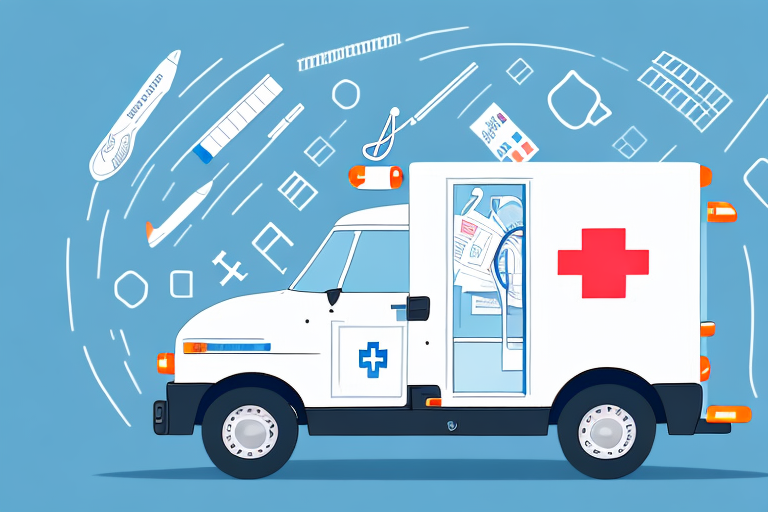How to Start a Successful Medical Courier Service
Launching a medical courier service can be a rewarding business venture, playing a crucial role in the healthcare ecosystem. This comprehensive guide provides detailed information to help you establish and grow a thriving medical courier service business. From understanding the industry to implementing effective marketing strategies, we cover all essential aspects to ensure your success.
1. Understanding the Medical Courier Service Industry
The medical courier service industry is integral to the healthcare sector, ensuring the safe and timely transportation of medical items such as lab specimens, medical equipment, and pharmaceuticals. According to the U.S. Bureau of Labor Statistics, the demand for reliable medical courier services is growing, driven by advancements in healthcare and an aging population.
Industry Overview
Medical couriers are responsible for delivering sensitive healthcare-related items between hospitals, clinics, laboratories, and other healthcare facilities. The industry demands high reliability to maintain the integrity of the items transported.
Key Challenges
- Ensuring Safe Delivery: Maintaining the integrity of medical specimens and equipment requires strict adherence to handling and transportation protocols.
- Regulatory Compliance: Couriers must comply with regulations set by bodies like the Department of Transportation and the Centers for Disease Control and Prevention (CDC).
2. Why Choose a Career in Medical Courier Service?
Opting for a career in the medical courier industry offers stability and the opportunity to contribute significantly to the healthcare system. The growing demand for medical services ensures a steady stream of business opportunities.
Benefits of the Industry
- Job Stability: The healthcare industry's expansion ensures consistent demand for medical courier services.
- Flexible Work Schedules: Many courier services offer flexible hours, catering to different lifestyles.
- Minimal Educational Requirements: Entry-level positions often require only a high school diploma and proper training.
Impact and Fulfillment
Working as a medical courier allows individuals to make a tangible impact on healthcare by ensuring that essential medical supplies and specimens reach their destinations promptly and safely.
3. Setting Up Your Medical Courier Service
Conducting Market Research
Begin by analyzing your local market to identify potential clients such as hospitals, laboratories, and clinics. Assess your competition to understand their pricing strategies and service offerings. Utilize resources like the Small Business Administration (SBA) for comprehensive market research tools.
Developing a Business Plan
A robust business plan outlines your business objectives, target market, marketing strategies, and financial projections. It serves as a roadmap for your business and is essential when seeking financing.
- Business Description: Define your services and the unique value you offer.
- Market Analysis: Detail your research findings, including target demographics and competitor analysis.
- Financial Projections: Include start-up costs, revenue forecasts, and break-even analysis.
Choosing a Legal Structure
Selecting the appropriate legal structure is vital for tax purposes and liability protection. Common structures include:
- Limited Liability Company (LLC): Offers liability protection and flexible tax options.
- S-Corporation: Suitable for businesses looking to offer stock and have specific tax benefits.
- C-Corporation: Ideal for larger businesses planning to reinvest profits and potentially go public.
Consult with a legal advisor or accountant to determine the best structure for your business needs.
Registering Your Business and Obtaining Licenses
Register your business with state and federal authorities. Obtain necessary licenses and permits, which may include:
- Business License
- Commercial Driver’s License (CDL)
- Hazardous Materials Transportation Permit, if applicable
- Medical Waste Transporter Permit, depending on your service offerings
Ensure compliance with regulations by consulting resources from the U.S. Department of Health & Human Services (HHS).
Setting Up Your Office and Acquiring Equipment
Your business will require a physical office space and reliable transportation means. Essential equipment and supplies include:
- Reliable Vehicles (e.g., vans or cars equipped for medical transport)
- GPS Navigation Systems
- Secure Packaging Materials
- First Aid Kits
Choose an office location that is easily accessible to your service areas and has adequate space for administrative tasks.
Recruiting a Competent Team
Hire qualified employees or independent contractors who possess valid driving licenses and clean driving records. Provide comprehensive training focused on:
- Proper handling and transportation of medical items
- Compliance with healthcare regulations
- Customer service skills
Offer competitive benefits to attract and retain top talent, enhancing your service reliability.
4. Building Relationships and Marketing Your Service
Establishing Partnerships with Healthcare Facilities
Building strong relationships with hospitals, clinics, and laboratories is crucial. Network through local healthcare events and offer exceptional service to encourage long-term partnerships.
Effective Marketing Strategies
Implement a mix of digital and traditional marketing strategies to promote your services:
- Digital Marketing: Utilize SEO, social media platforms, and email campaigns to reach a broader audience.
- Traditional Marketing: Distribute brochures and flyers in healthcare facilities and attend industry conferences.
- Referral Programs: Encourage satisfied clients to refer your services to others by offering incentives.
Providing Exceptional Customer Service
Customer satisfaction drives loyalty and referrals. Ensure prompt deliveries, clear communication, and a willingness to accommodate client needs. Implement feedback mechanisms to continuously improve your services.
5. Managing Operations and Finances
Financial Management and Budgeting
Effective financial management is essential for sustainability. Track expenses such as vehicle maintenance, fuel, employee salaries, and insurance. Utilize accounting software or hire a professional accountant to maintain accurate financial records.
Implementing Quality Control Measures
Quality control ensures the safety and reliability of your deliveries. Establish protocols for handling and transporting medical items, and conduct regular training sessions to maintain high standards.
- Regular Vehicle Maintenance
- Compliance Audits
- Employee Performance Reviews
6. Scaling and Expanding Your Medical Courier Service
Expanding Service Areas
Growth opportunities include expanding your service to neighboring cities or regions. Conduct market research to identify high-demand areas and strategize entry accordingly.
Partnering with Other Businesses
Collaborate with other businesses in the healthcare sector to enhance service offerings and reach a larger client base. Partnerships can lead to joint ventures and shared resources, fostering mutual growth.
Adopting Advanced Technologies
Invest in technologies such as route optimization software and real-time tracking systems to improve efficiency and provide better services to clients.
Conclusion
Starting a medical courier service requires thorough planning, adherence to regulations, and a commitment to exceptional service. By conducting comprehensive market research, developing a solid business plan, and implementing effective marketing and operational strategies, you can establish a successful and impactful medical courier business. Stay informed about industry trends and continuously seek ways to innovate and improve to ensure long-term success.




















